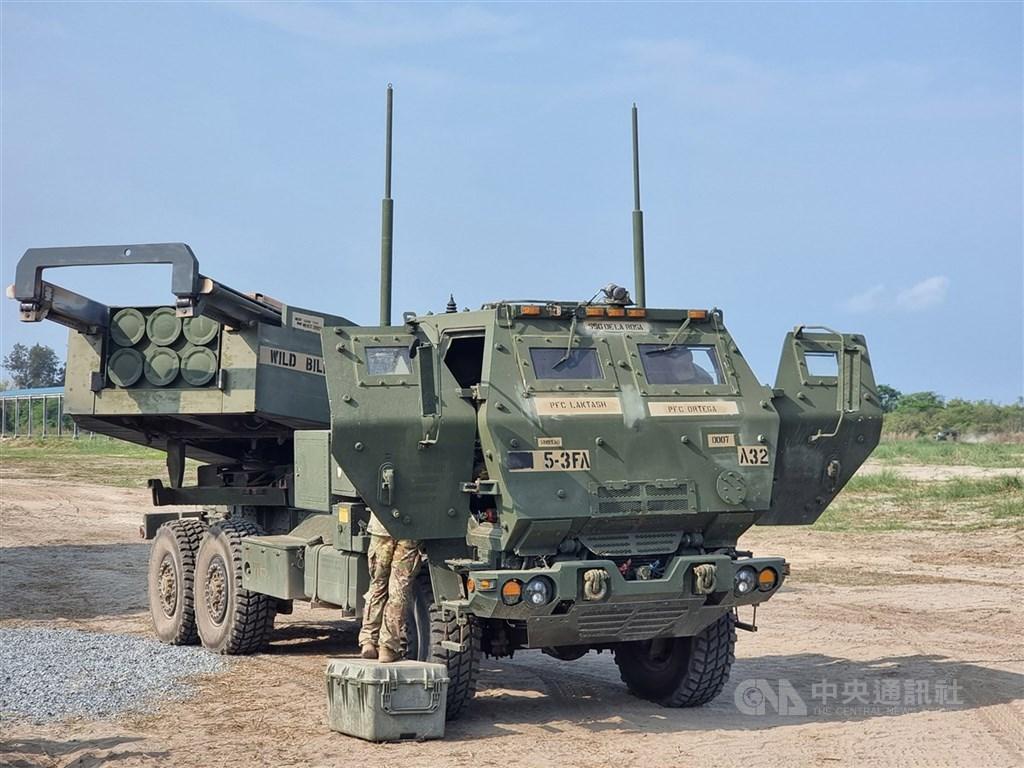The US Department of Defense (DOD) is committed to strengthening Taiwan’s defense capabilities, despite growing concerns over the economic impact of US President Donald Trump’s newly imposed “reciprocal” tariffs of 32 percent on Taiwan goods, a DOD official said yesterday.
The DOD is “working to prioritize our security systems to Taiwan,” Assistant Secretary of Defense for Indo-Pacific Security Affairs John Noh said.
Trump’s “reciprocal” tariffs, slapped on countries worldwide, came into effect yesterday and have become the center of US political debate.

Photo: CNA
However, Trump announced yesterday that he would place Taiwan’s tariffs on a 90-day pause along with many other nations and revert to the US baseline tariff of 10 percent, suspending the additional 22 percent, after President William Lai (賴清德) pledged on Sunday that Taiwan would not retaliate against the measures.
Taiwan’s stock market has already taken a hit since last Wednesday’s tariff announcement, with the TAIEX posting the highest single-day percentage loss on record on Monday and continuing to plummet as of yesterday.
Taiwan’s economy would be significantly affected if 32-percent tariffs come into effect, with GDP poised to fall below 3 percent and potentially even dip to as low as 1.53 percent this year, National Development Council Minister Paul Liu (劉鏡清) said yesterday.
“If we hurt the Taiwanese economy, how can the administration demand that Taiwan spend more on its own defenses?” US Representative Eric Sorensen asked at the US House Committee on Armed Services meeting yesterday.
Yesterday morning’s “Hearing on Indo-Pacific Security Challenges” invited Pentagon and military leaders to testify.
“Arming Taiwan and strengthening Taiwan’s defense capabilities is extremely important for not only the defense of Taiwan but for strengthening our posture and reestablishing deterrents,” Noh said.
“President Trump has stated that China will not attack Taiwan on his watch. Thus, we must, with urgency and focus, prioritize efforts to strengthen deterrence against Chinese aggression in the Indo-Pacific,” he then said in a written statement.
Although Taiwan has committed to increase its defense budget to exceed 3 percent of its GDP, as requested by the US, “it must do significantly more,” he added.
Congressman Eric Sorensen pledged his support for Taipei, and said he would first “acknowledge Taiwan, both as a democracy and a strategic ally.”
“While we work to boost our own domestic semiconductor manufacturing capabilities, we must ensure that Taiwan is able to contribute to our supply chains,” he said, adding that the US and Taiwan must work together to develop new technology and innovation.
“That means that we must also remain steadfast partners in the region as China continues to develop its offensive power,” he said.
“The future of Taiwan does matter to American interests,” Noh said.
To support Taiwan, the department would utilize security assistance authorities and resources, such as the Presidential Drawdown Authority (PDA), Foreign Military Sales (FMS), Foreign Military Financing (FMF) and the Taiwan Security Cooperation Initiative (TSCI), he said.
The PDA is a process under which the US can send equipment and weapons from existing stocks to its allied partners in crisis situations and without prior congressional approval.
Former US President Joe Biden invoked the PDA three times to send over US$1 billion worth of defense articles and services to Taiwan during his term.
The TSCI is modeled on the Ukraine Security Cooperation Initiative, which allows the US to purchase military equipment directly from private companies for allies or partners.
The initiative also authorizes the Pentagon to provide up to US$300 million worth of military articles and training to Taiwan.

A small number of Taiwanese this year lost their citizenship rights after traveling in China and obtaining a one-time Chinese passport to cross the border into Russia, a source said today. The people signed up through Chinese travel agencies for tours of neighboring Russia with companies claiming they could obtain Russian visas and fast-track border clearance, the source said on condition of anonymity. The travelers were actually issued one-time-use Chinese passports, they said. Taiwanese are prohibited from holding a Chinese passport or household registration. If found to have a Chinese ID, they may lose their resident status under Article 9-1

Taiwanese were praised for their composure after a video filmed by Taiwanese tourists capturing the moment a magnitude 7.5 earthquake struck Japan’s Aomori Prefecture went viral on social media. The video shows a hotel room shaking violently amid Monday’s quake, with objects falling to the ground. Two Taiwanese began filming with their mobile phones, while two others held the sides of a TV to prevent it from falling. When the shaking stopped, the pair calmly took down the TV and laid it flat on a tatami mat, the video shows. The video also captured the group talking about the safety of their companions bathing

A classified Pentagon-produced, multiyear assessment — the Overmatch brief — highlighted unreported Chinese capabilities to destroy US military assets and identified US supply chain choke points, painting a disturbing picture of waning US military might, a New York Times editorial published on Monday said. US Secretary of Defense Pete Hegseth’s comments in November last year that “we lose every time” in Pentagon-conducted war games pitting the US against China further highlighted the uncertainty about the US’ capability to intervene in the event of a Chinese invasion of Taiwan. “It shows the Pentagon’s overreliance on expensive, vulnerable weapons as adversaries field cheap, technologically

Starting on Jan. 1, YouBike riders must have insurance to use the service, and a six-month trial of NT$5 coupons under certain conditions would be implemented to balance bike shortages, a joint statement from transportation departments across Taipei, New Taipei City and Taoyuan announced yesterday. The rental bike system operator said that coupons would be offered to riders to rent bikes from full stations, for riders who take out an electric-assisted bike from a full station, and for riders who return a bike to an empty station. All riders with YouBike accounts are automatically eligible for the program, and each membership account